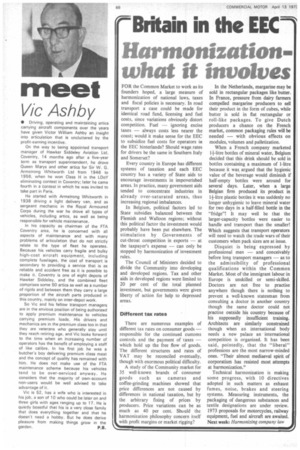'Britain in the EEC
Page 68

If you've noticed an error in this article please click here to report it so we can fix it.
Harmonization
what it involves
FOR the Common Market to work as its founders hoped, a large measure of harmonization of national laws, taxes and fiscal policies is necessary. In road transport a case could be made for identical road fund, licensing and fuel costs, since variations obviously distort competition. Fuel — ignoring excise taxes — always costs less nearer the coast; would it make sense for the EEC to subsidize fuel costs for operators in the EEC hinterlands? Should wage rates for drivers be the same in Southern Italy and Somerset?
Every country in Europe has different systems of taxation and each EEC country has a variety of State aids to encourage investments in impoverished areas. In practice, many government aids tended to concentrate industries in already over-saturated areas, thus increasing regional imbalances.
In Belgium, political factors led to State subsidies balanced between the Flemish and Walloon regions; without this political factor the investment would probably have been put elsewhere. The stimulation by Governments of cut-throat competition in exports — at the taxpayer's expense — can only be stopped by harmonization of investment rules.
The Council of Ministers decided to divide the Community into developing and developed regions. Tax and other aids in developed regions were limited to 20 per cent of the total planned investment, but governments were given liberty of action for help to depressed areas.
Different tax rates There are numerous examples of different tax rates on consumer goods — responsible for the continued customs controls and the payment of taxes — which hold up the free flow of goods. The different structures and rates of VAT may be reconciled eventually, though with enormous political difficulty.
A study of the Community market for 35 well-known brands of consumer goods such as cameras and coffee-grinding machines showed that price differences are not caused by differences in national taxation, but by the arbitrary fixing of prices by producers. Price variations can be as much as 40 per cent. Should the harmonization philosophy concern itself with profit margins or market rigging? In the Netherlands, margarine may be sold in rectangular packages like butter. In France, pressure from dairy farmers compelled margarine producers to sell their product in the form of cubes, while butter is sold in flat rectangular or roll-like packages. To give Dutch producers a chance on the French market, common packaging rules will be needed — with obvious effects on modules, volumes and palletization.
When a French company marketed 14-litre bottles of mineral water, Belgium decided that this drink should be sold in bottles containing a maximum of 1-litre because it was, argued that the hygienic value of the beverage would diminish if half-empty bottles were around for several days. Later, when a large Belgian firm produced its product in 14-litre plastic bottles it was suddenly no longer unhygienic to leave mineral water for two days in a half-filled bottle in the "fridge"! It may well be that the larger-capacity bottles were easier to handle and transport than the smaller! Which suggests that transport operators will need to watch the trade wars of their customers when pack sizes are at issue.
Disquiet is being expressed by professional men — and conceivably before long transport managers — as to the admissibility of professional qualifications within the Common Market. Most of the immigrant labour in Europe is unskilled or semi-skilled. Doctors are not free to practise anywhere though there is nothing to prevent a well-known statesman from consulting a doctor in another country though the same doctor could not practise outside his country because of his supposedly insufficient training. Architects are similarly constrained though when an international body needs a new palace an international competition is organized. It has been said, pointedly, that the "liberal" professions are the most narrow-minded ones. "Their almost mediaeval spirit of corporatism has resisted most attempts at harmonization."
Technical harmonization is making some progress, with 10 directives adopted in such matters as exhaust fumes, noise, brakes and steering systems. Measuring instruments, the packaging of dangerous substances and textile designations are under review. 1973 proposals for motorcycles, railway equipment, fuel and aircraft are awaited. Next week: Harmonizing company law
























































































































